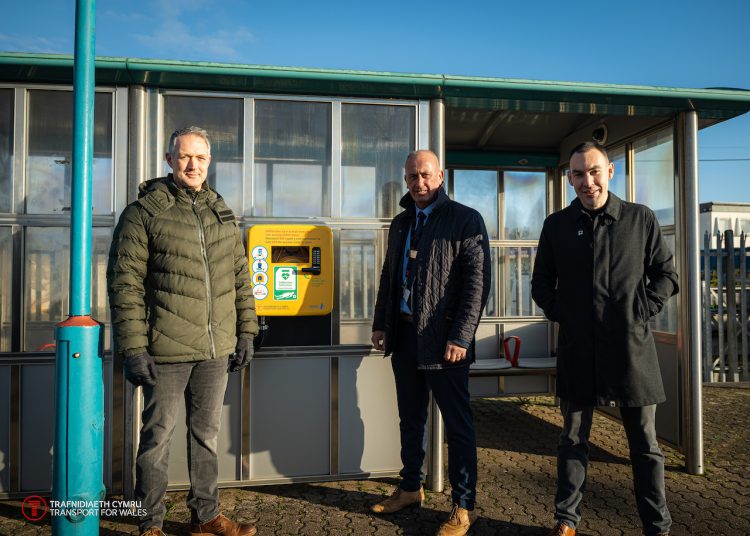Work is now underway to install over 200 life-saving defibrillators at Transport for Wales railway stations throughout Wales and the borders.
The essential installation of defibrillators also coincides with ‘Defibuary’ which is a month-long campaign organised by the Welsh Ambulance Services NHS Trust in a bid to raise awareness of the importance of the life-saving devices.
The project is in its first phase, and will see defibrillators fitted at 53 Transport for Wales (TfW) stations.
Further defibrillators will be put in place during spring and once ready for action will be uploaded onto the British Heart Foundation’s bespoke portal, called The Circuit, in collaboration with St Johns Ambulance, the Resuscitation Council UK and the Association of Ambulance Chief Executives.
The Circuit provides a map of defibrillators for NHS ambulance services throughout the UK, so during the crucial moments following cardiac arrest, they can quickly direct members of the public to the nearest defibrillator.

Jeremy Williams, Transport for Wales Head of Stations, said:
“Our defibrillators are so important in helping those who may experience a cardiac arrest, be they TfW customers, colleagues or someone in the local community.
“We already have some defibrillators across the Wales and Borders route and these additional 200 machines will become a valuable life-saving resource.”
The programme has been put together by TfW’s Rail Infrastructure Karl Gilmore, who said:
“All of the defibrillators will be available 24 hours a day but, more crucially, they will all be listed on The Circuit so emergency services staff know where they are located.”
“Our staff will be given training on how to use the defibrillators and we’re working with charities and other organisations to make sure we can roll out training into communities.”
The project has seen strong support from the British Heart Foundation Cymru and the Welsh Ambulance Service. The use of a defibrillator greatly improves a person’s chances of survival if they experience an out-of-hospital cardiac arrest.
Adam Fletcher, Head of BHF Cymru said:
“Every second counts when someone has a cardiac arrest and, alongside CPR, prompt use of a defibrillator is critical in giving them the best chance of survival. To put it simply – being able to access a defibrillator could be the difference between life and death.”
“We know defibs save lives and it’s why we are so proud to be working with Transport for Wales. They’ve made a big investment to get 200 defibrillators out across the rail network and we hope other organisations will follow their example.”
The initiative has been organised to help people like Andrew Barnet, 48, a married father of two from Cardiff, who suffered a cardiac arrest in December 2018 when playing in a parent and child football match. Andrew was fortunate that there was a defibrillator located at a nearby leisure centre and staff were able to use it on him. Sadly in Wales only 5% of people who have an out of hospital cardiac arrest survive.
Andrew said:
“The leisure centre staff were told there was an issue on the pitch and they could tell pretty quickly something serious was going on.”
“Thankfully they started CPR and were able to use a defibrillator that’s located in the leisure centre.”
“Having a network of defibrillators which are easily accessible is absolutely key to keeping people safe. Cardiac arrests can happen at any time or anywhere and it’s something which can happen to a range of people, as we’ve seen from recent high-profile cases with footballers.”
Survival rates decrease by 10% each minute without CPR or the use of a defibrillator. Using a defibrillator within three minutes of a cardiac arrest can improve a person’s chance of survival by as much as 70%.
Carl Powell, Clinical Support Lead for Cardiac Care for the Welsh Ambulance Service, said:
“For anyone having an out of hospital cardiac arrest their chance of survival decreases by 10% for every minute that goes by, without someone doing CPR or using a defibrillator on them.”
“Having more public access defibrillators out there will increase people’s chances of survival significantly, particularly in rural areas where defibrillators might not previously have been available.”
“Rural train stations can be the hub of the area so to have defibrillators in the station is vitally important to support the local community.”
To find out more, please visit: http://www.bhf.org.uk






Responses